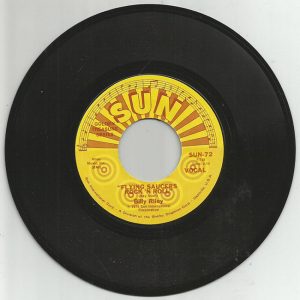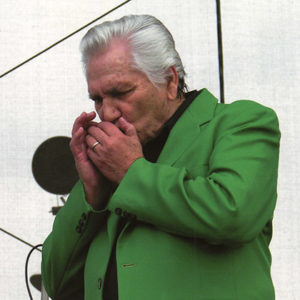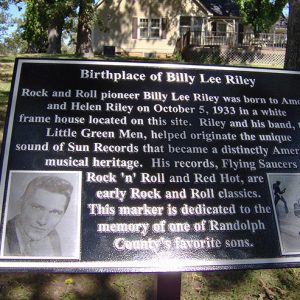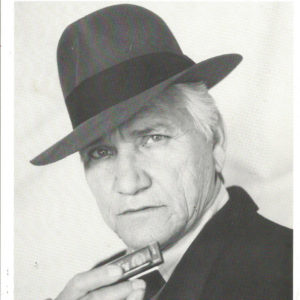calsfoundation@cals.org
Billy Lee Riley (1933–2009)
Billy Lee Riley was a rockabilly musician whose career began in the Arkansas Delta and peaked in the 1950s after he signed a record deal with Sun Records in Memphis, Tennessee. He recorded many songs during his life, alternating between the rockabilly style that made him famous and the blues music that he loved.
Billy Lee Riley was born in Pocahontas (Randolph County) on October 5, 1933, to Amos and Mae Riley; he was one of nine children. Although his father was a house painter by trade, the economic disparities of the time led the family into sharecropping. As a result, the Riley family moved frequently to different towns in Arkansas, at times living in intense poverty. Through this lifestyle, Riley found a taste for the blues. At age six, he learned to play the harmonica and was introduced to the blues for the first time by his African-American playmates, who took him to their side of town to listen to music. Many Saturdays he could be found sitting on the back steps of honkytonks listening to the jukebox.
Riley received only three years of formal education, quitting school to help earn money for the family by picking cotton. In 1943, during a small period of prosperity, Riley’s father bought Riley’s first guitar, a Silvertone, from a family friend. Riley began to learn to play it after moving to Forrest City (St. Francis County) and meeting a couple of young guitar players.
In 1949, at age fifteen, Riley joined the army and served until 1953, during which time he further improved his guitar skills. Upon his honorable discharge from the army, he returned to Arkansas and started a hillbilly band that played shows at high schools and appeared on local radio shows. In 1954, he married his first wife, with whom he had one child. In 1955, after a failed attempt at running a restaurant in Memphis, Riley met Jack Clement and his partner Slim Wallace, who gave him a opening in the music business. They were both established in Nashville, Tennessee, and invited him to join their band and sing at Wallace’s club in Paragould (Greene County). In March 1956, Riley recorded his first two songs at Fernwood Studios, owned by Clement and Wallace. The two tracks found their way into the hands of Sam Phillips at Sun Records. After hearing one of the songs, Phillips insisted on having another, to which Riley obliged by writing and singing, “Rock with Me Baby.” He then signed a record deal with Sun Records that lasted from 1956 to 1960.
Riley’s fickle career hit its high in the late 1950s while he was recording for Sun Records. In 1957, he released his two most popular songs, “Flying Saucer Rock and Roll,” a track that encouraged him to call his band the Little Green Men, and “Red Hot.” It was during this period that he met Jerry Lee Lewis, who played in his band for a short while, although Sam Phillips insisted there was no need for a piano player in a rockabilly band. A takeoff in Lewis’s career later greatly affected Riley’s. In 1958, Riley was set to go on tour to promote his single “Red Hot,” which was becoming recognized around the country. However, the track was abandoned by Phillips, who chose to endorse Lewis’s “Great Balls of Fire” instead.
Riley then left Sun Records, though he returned to record three more songs before leaving again in 1960. He and a former band member established Rita Records after his break with Sun, but it disintegrated quickly. He founded another label, Mojo Records, but after producing Willie Cobbs’s “You Don’t Love Me,” he abandoned the failing venture.
In 1962, Riley moved to Los Angeles, California, where he began working as a studio musician for artists such as Glen Campbell and Leon Russell. He was a featured harmonica player on recordings for the Beach Boys, Sammy Davis Jr., Rick Nelson, and Dean Martin, among others. He appeared on several television shows and recorded six albums before leaving California in 1966. For the next nine years, he dabbled in music, recording for several different studios and even reviving his own Mojo label for a while, all without significant commercial success.
In the early 1970s, Riley divorced his second wife, with whom he had two children. In 1975, he married Joyce Riley, with whom he had one daughter. Around the time of their marriage, he abandoned music and started decorating houses, but he was unable to stray from the music business for long. After a performance at the Memphis in May music festival in 1979, he toured in Europe throughout the 1980s, performing his popular songs from the 1950s as well as many blues numbers. He recorded his first all-blues album in 1991 and afterward was rediscovered by Bob Dylan, perhaps his most well-known fan. In 1997, his blues album Hot Damn was considered for a Grammy. His last recording was in March 2009, on which he sang on several tracks for Pocahontas native Gary Gazaway’s album Arkansas Traveler: A Cross-Cultural Excursion Into the Historical Music Heritage of the Americas.
On August 2, 2009, Riley died of colon cancer in Jonesboro (Craighead County). He is buried at Walnut Grove Cemetery in Newport (Jackson County). He had lived in Newport with his wife for many years. In 2022, he was posthumously inducted into the Memphis Music Hall of Fame.
For additional information:
“Billy Lee Riley.” Delta Boogie. http://www.deltaboogie.com/deltamusicians/rileyb/ (accessed March 9, 2022).
Burke, Ken. “The Billy Lee Riley Interview!” Rocktober, September 1999. Online at www.rockabilly.net/billyleeriley/interview.shtml (accessed March 9, 2022).
Clancy, Sean. “Unsung Hero Billy Lee Riley to Be Inducted.” Arkansas Democrat-Gazette, September 6, 2022, pp. 1D, 6D. Online at https://www.arkansasonline.com/news/2022/sep/06/unsung-hero-billy-lee-riley-to-be-inducted/ (accessed September 6, 2022).
Obituary of Billy Lee Riley. Arkansas Democrat-Gazette. August 4, 2009, p. 4B.
Whayne, Jeannie. “Interview with Billy Lee Riley.” Arkansas Historical Quarterly 55 (Autumn 1996): 297–318.
Kayla Kesterson
University of Central Arkansas
 Rock and Roll Music
Rock and Roll Music "Flying Saucers Rock 'n Roll"
"Flying Saucers Rock 'n Roll"  Billy Lee Riley
Billy Lee Riley  Billy Lee Riley Memorial
Billy Lee Riley Memorial  Billy Lee Riley
Billy Lee Riley 




Comments
No comments on this entry yet.